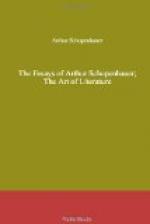The lowest class in the community is quite impervious to the merits of a great genius; and for these people there is nothing left but the monument raised to him, which, by the impression it produces on their senses, awakes in them a dim idea of the man’s greatness.
Literary journals should be a dam against the unconscionable scribbling of the age, and the ever-increasing deluge of bad and useless books. Their judgments should be uncorrupted, just and rigorous; and every piece of bad work done by an incapable person; every device by which the empty head tries to come to the assistance of the empty purse, that is to say, about nine-tenths of all existing books, should be mercilessly scourged. Literary journals would then perform their duty, which is to keep down the craving for writing and put a check upon the deception of the public, instead of furthering these evils by a miserable toleration, which plays into the hands of author and publisher, and robs the reader of his time and his money.
If there were such a paper as I mean, every bad writer, every brainless compiler, every plagiarist from other’s books, every hollow and incapable place-hunter, every sham-philosopher, every vain and languishing poetaster, would shudder at the prospect of the pillory in which his bad work would inevitably have to stand soon after publication. This would paralyze his twitching fingers, to the true welfare of literature, in which what is bad is not only useless but positively pernicious. Now, most books are bad and ought to have remained unwritten. Consequently praise should be as rare as is now the case with blame, which is withheld under the influence of personal considerations, coupled with the maxim accedas socius, laudes lauderis ut absens.
It is quite wrong to try to introduce into literature the same toleration as must necessarily prevail in society towards those stupid, brainless people who everywhere swarm in it. In literature such people are impudent intruders; and to disparage the bad is here duty towards the good; for he who thinks nothing bad will think nothing good either. Politeness, which has its source in social relations, is in literature an alien, and often injurious, element; because it exacts that bad work shall be called good. In this way the very aim of science and art is directly frustrated.
The ideal journal could, to be sure, be written only by people who joined incorruptible honesty with rare knowledge and still rarer power of judgment; so that perhaps there could, at the very most, be one, and even hardly one, in the whole country; but there it would stand, like a just Aeropagus, every member of which would have to be elected by all the others. Under the system that prevails at present, literary journals are carried on by a clique, and secretly perhaps also by booksellers for the good of the trade; and they are often nothing but coalitions of bad heads to prevent the good ones succeeding. As Goethe once remarked to me, nowhere is there so much dishonesty as in literature.




